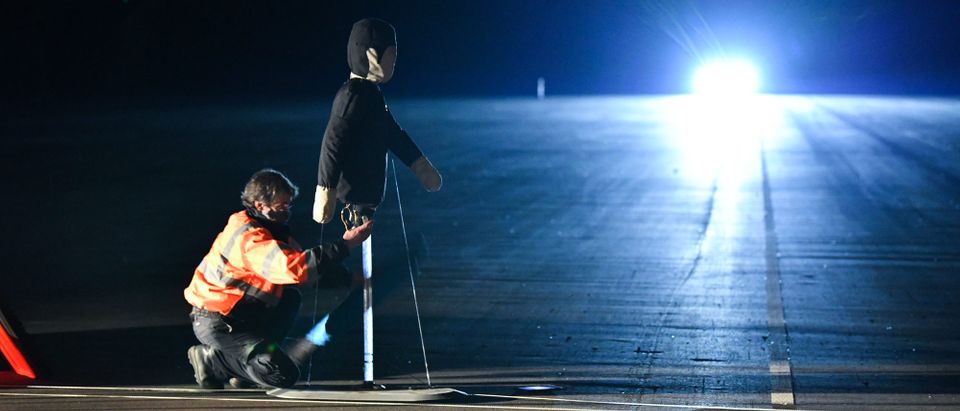The majority of cars that utilize pedestrian automatic emergency braking (AEB) systems to automatically stop cars in the event a driver does not react to a pedestrian perform significantly worse at night, according to the Insurance Institute for Highway Safety (IIHS).
The IIHS tested 23 midsize SUVs and small pickups, 19 of which scored sufficiently high to receive an IIHS Top Safety Pick during daytime tests, but only 11 scored that well in nighttime tests, according to a press release. Three-quarters of pedestrian traffic fatalities occur at night, according to the IIHS, with pedestrian fatalities having risen 80% since a low in 2009, at 7,342 deaths per year as of 2021, according to Reuters. (RELATED: Dramatic Footage Shows SUV Tipping Over And Crushing Firefighter)
”It’s discouraging that so many midsize SUVs and small pickups perform poorly in the nighttime test because research suggests these types of vehicles are more dangerous to pedestrians,” said IIHS President David Harkey in the press release. The referenced research is a June 2020 IIHS study that concluded that SUVs were more lethal than other types of cars at a variety of speeds, based on a sample of 79 Michigan crashes that the researchers determined was “small and limited,” necessitating a larger study.
Only four of the 23 models tested so far in IIHS’s new nighttime pedestrian autobrake test performed well enough to earn the highest rating of superior.
Full ratings: https://t.co/64WmmC9YqR pic.twitter.com/5Ed0quVDsw
— IIHS (@IIHS_autosafety) August 30, 2022
The IIHS tested the ability of a car to stop before hitting a pedestrian in 2 common scenarios, a test where cars going at 12 miles-per-hour (mph) and 25 mph hit a pedestrian crossing the street, and a test where cars going at 25 mph and 37 mph hit a pedestrian walking along the edge of a travel lane, according to the IIHS.
Toyota’s Tacoma pickup truck, which the IIHS gave a “no credit” rating, does not possess a system capable of detecting pedestrians at night, Toyota told the Daily Caller News Foundation in a statement. The Toyota Highlander and Camry were two of just four cars to receive a “superior” rating, and had much more advanced technology, Toyota told the DCNF.
“While we cannot comment on specific 3rd party testing or rating strategies we can say that Toyota was one of the first companies to make such safety technologies standard, and we have a long history of deploying active safety technologies and driver support systems that align with our stated goals to help reduce and/or eliminate traffic accidents,” Toyota said.
Volkswagen, on the other hand, had all three of its tested cars receive a “basic” rating, but told the DCNF it expected to do better in the future.
“We knew in advance that the vehicles that were tested were on the first generation of the MQB platform and it was too late to make improvements to this platform for the test,” Volkswagen said. “These vehicles use radar only. We are confident that the next versions of the Atlas, Atlas Cross Sport and Tiguan should perform better because they fuse camera and radar sensors.”
An IIHS spokesperson told the DCNF that while radar systems do not rely on light levels and are thus unaffected by ambient light conditions, most vehicles use either only a camera system or a camera in combination with radar to accurately identify pedestrians.
All content created by the Daily Caller News Foundation, an independent and nonpartisan newswire service, is available without charge to any legitimate news publisher that can provide a large audience. All republished articles must include our logo, our reporter’s byline and their DCNF affiliation. For any questions about our guidelines or partnering with us, please contact licensing@dailycallernewsfoundation.org.


